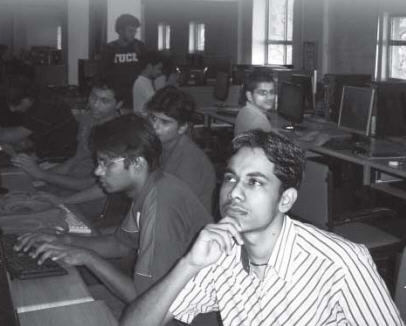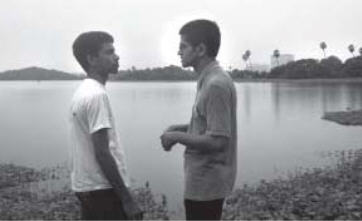An engineer brings out the science behind the culture of devotion.

I was sitting in my lab in the basement of the Computer Science Department in IIT Mumbai. Aditya walked in, as if in a trance, and sat down in front of his computer without even noticing me. After half an hour or so, he was still in his reverie.
“Aditya!” I called out from across the lab.
“Oh! Hi! You are here. I have been looking for you.”
I didn’t tell him that I was here for the last half an hour.
“Let’s go for a walk,” I suggested. It was mid-morning of a gorgeous winter day. Streams of water came in bursts from the rotating sprinklers and sparkled brilliantly under the morning sun and then splashed over the beautifully manicured lush green lawns inside the IIT campus.
Aditya is a brilliant B.Tech. Computer Science student in IIT. He is fun-loving and jolly, but at the same time he is looking for answers to the deepest questions of life.
“I went to the ISKCON temple yesterday,” Aditya opened up, “and the speaker said that spirituality was as scientific and logical as any other branch of science. In what ways is spirituality scientific? Can you please explain? The answer to this question is very important to me.”
I have been associated with ISKCON for a few years now, and I am also Aditya’s fellow IITian. This combination led him to me.
Is Spirituality Scientific?
While walking past the lawns I collected my thoughts. I replied, “To understand this, we need to first understand what the general definition of the scientific method is. In principle, the scientific method consists of the collection of data through observation and experimentation, and the formulation and testing of hypotheses. The hypotheses act as a guiding light for the subsequent experiments. The results of those experiments give the hypotheses various degrees of truth. If the results of the experiments match with the predictions of the hypotheses, the hypotheses are declared as truths. Otherwise, the hypotheses are discarded.”
Aditya nodded. “So then, can we apply the scientific method in our quest for spiritual truths?” he asked.
“Yes, we can. Based on what we see around us in nature the symmetry, the design, the laws, the beauty, the majesty, the intricacy, etc. we can surely hypothesize the existence of a supremely intelligent being who is the source of all that exists. Since hypotheses are part of the scientific method, we are still within the realms of science. This assertion has been confirmed by many of the most celebrated scientists and thinkers that we know of. For example: Newton said, ‘The wonderful arrangement and harmony of the cosmos would only originate in the plan of an almighty omniscient being. This is by far the greatest comprehension.’”
“But what about the experiments? And what about the results of those experiments? Until we get those results, God will just remain a hypothesis.” Aditya was quick to point out.
I was ready. “The holy scriptures of all major religions have asserted the existence of God. Along with the assertions are given the processes by following which one can perceive God in lesser or greater degrees. Therefore, all that is needed in perceiving God is sincere effort along a well-documented path as revealed in the holy scriptures. The effects of following the scriptures, including the effect of being able to perceive God directly, depend a lot on the sincerity of the seeker. God knows everything, including the seeker’s sincerity, his motivations for approaching God, his past deeds, and many other factors. Based on all these, God reciprocates with the seeker. Based on the degree of reciprocation by God, the internal world (essentially the desires) of the seeker surely gets transformed, whether the seeker’s external circumstances do so or not. And the perception of God no longer remains mere theory. Although direct audience with God is very difficult to achieve quickly, many other tangible results are experienced in a short span of time, and this builds one’s confidence in the scriptural instructions.”
Are Spiritual Experiences Mere Hallucination?

A cloud of doubt covered Aditya’s bright face. Meanwhile we had turned right on the main road towards the IIT guesthouses. “But how can we be sure that what we experience is not some hallucination?”
We were going deeper into the subject matter now. I replied simply, “A sincere seekers realizations are in line with the principles of the scriptures. As one progresses along the spiritual journey, God reciprocally empowers the senses of the seeker to perceive Him. Hallucinations are illusory perceptions characteristic of mentally deranged people, whereas realization of spiritual truths helps the practitioner, even in day-to-day affairs, to lead better and more meaningful lives. A spiritualist is in much better control of his life than many others, and certainly more so than one gripped by hallucinations. Many sane and highly intelligent people have experiences of God. Powerful yogis and other transcendentalists in all traditions of the world, past and present, have spoken or written about their experiences with God. Would you call all their experiences hallucinations?”
Scientific Faith
Aditya was starting to enjoy this discussion. He was getting answers to the questions that had disturbed him. And he liked a light-hearted verbal fight. “Why should I follow the holy scriptures and the holy men blindly? Is that scientific?” As soon as he asked the question, the answer also struck him. Even before I replied, he exclaimed, “Let me answer that myself! Having reasonable faith in the words of the holy scriptures and of the sincere devotees of God is like accepting the existence of God as a sound hypothesis. Following the processes they recommend is like the experiments.”
I was impressed. I elaborated a bit more on it. “Yes, that’s correct. Initially a little bit of reasonable faith is required to start on a path suggested by the scriptures and the devotees of God. But that faith is quite a reasonable one. Along with that is also needed a systematic understanding of the science of God. This understanding, along with the sincere practice, will fortify our faith when we see that the results of following the process match with what the process states. And the fortified faith, in turn, will inspire us to follow the process even more sincerely, leading us to even deeper experiences of God. This science is presented in the holy scriptures.
As with any other form of learning, a teacher advanced in the practice of the science is a must. From him one can take practical instructions, ask questions, and study the scriptures under his guidance. Quite naturally, such a teacher is himself a devotee of God, otherwise how can he guide his students towards a practical direct perception of God?”
Sharp that he was, Aditya asked me, “What tangible effects can be seen by following the processes? How can we know that they work? We can verify other processes by the results they produce. What about spiritual processes?”
We had entered into the area of the guesthouses, which overlooked the Powai lake. As we walked along the bank of the lake, I replied, “Spiritual processes also produce tangible results. While results of other processes can be verified in a laboratory in a university campus, the results of spiritual processes can be verified in the laboratory of one’s own heart. By practicing spiritual processes, the dirty things in the heart like lust, greed, anger, etc., reduce drastically. These are very tangible transformations and can be verified by the practitioner. Before taking up spiritual practices, a person may have many bad habits like smoking, drinking, etc., which he may find almost impossible to give up. But as if by magic, without too much effort, these bad habits disappear from the life of the practitioner. Along with that relief comes the lasting joy of spiritual happiness; he thoroughly enjoys the process itself. This is because spiritual activities are natural to the soul and therefore most joyful. The practitioner experiences a positive energy by coming in touch with his real spiritual nature and eternal relationship with the Supreme Lord. And based on these tangible results, the practitioner is inspired to continue following the process. In fact, what used to be abstract and theoretical yesterday becomes practical and tangible today.”
To drive the point home, I challenged him, “If the scientific method of gaining knowledge is considered scientific, how then is following a spiritual process as described above not scientific?”
Aditya’s face became grave. He thought for a while. The sunlight was dancing on the ripples of the lake. Aditya replied, “What you say sounds very logical to me. I am convinced. In fact, I wonder why so many people oppose the idea of God and spirituality. It’s a verifiable science, and it is genuinely helpful to everyone who follows it.” As we reached towards the end of the road, Aditya’s mood was once again happy and bubbling. “Hey, you know what? Today I have learnt the oldest system of logic that exists!”
“What’s it called?” I played up to his mood.
“The God Logic,” he roared.
Abhijit Toley did M.Tech.in Computer Science from IIT Mumbai and is presently working as a Senior Software Engineer in an MNC in Pune. Check his blog http://thebandwagonofmoltengold.blogspot.com/
